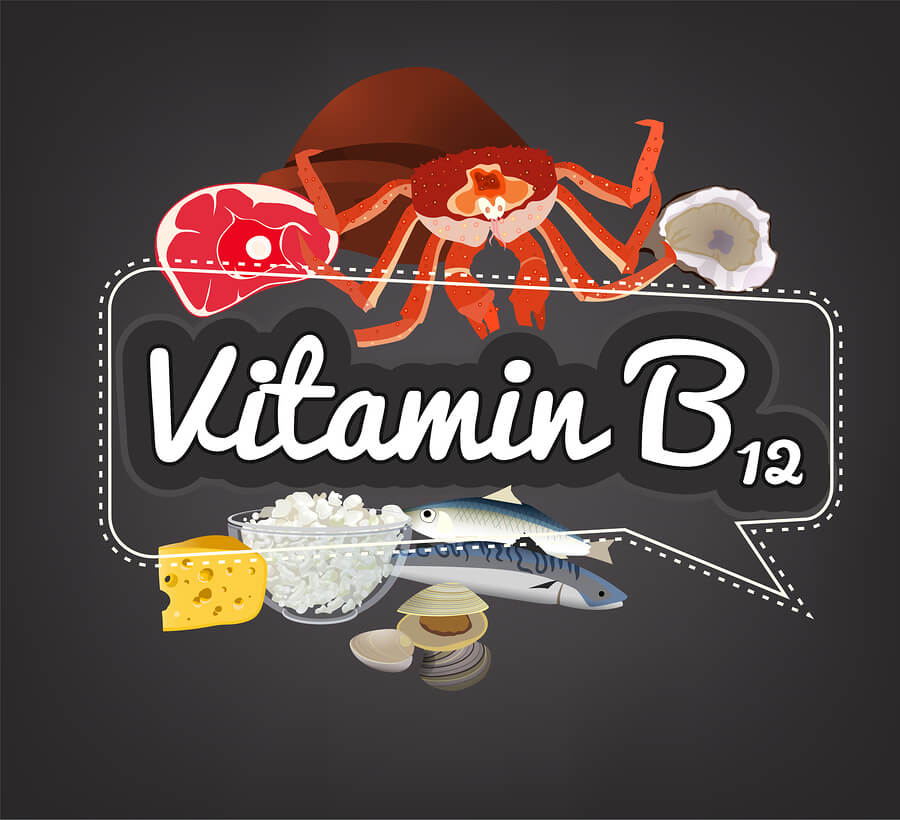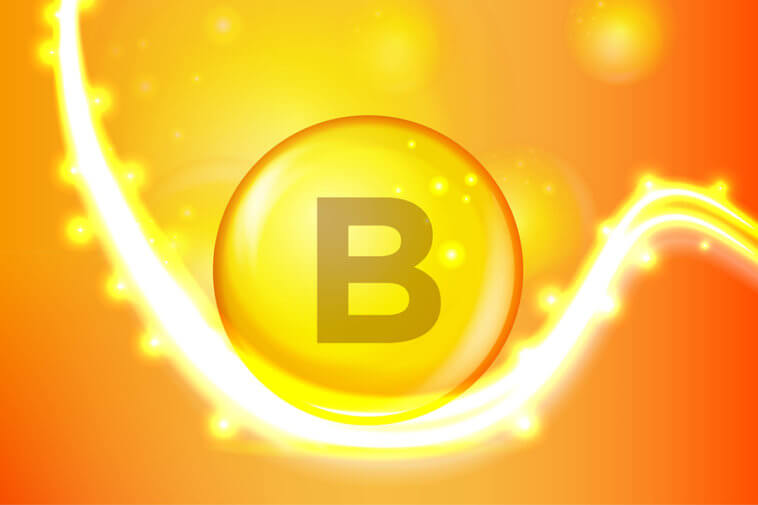Good health is tied to good nutrition and both aid in the prevention of many different conditions. There's a recommended amount of vitamins that you should have each day but most people aren't getting them.
These vitamins are a very important part of the nutrition equation. When it comes to preventative care, vitamin B is vital.
When it comes to vitamin B, there are many different types. All together, there are 8 essential B vitamins. It's crucial you get these types of nutrients either from food or by taking a supplement. Your body needs these nutrients to carry out basic tasks and keep your systems running in top shape.

What Does Vitamin B Do For The Body?
B vitamins play a vital role when it comes to maintaining your overall good health and well-being. These vitamins have a direct impact on your brain function, levels of energy, and your cell metabolism.
Vitamin B complex will help your body prevent infections and helps to support:
- Growth of red blood cells
- Levels of energy
- Maintaining good digestion
- Good vision
- Proper function of your nervous system
- Muscle tone
- Healthy cardiovascular system
- Good hormone levels
For women, B vitamins are especially important while pregnant as well as breastfeeding. These vitamins help the development of the fetal brain and helps to reduce the risk of birth defects. For pregnant women, B Vitamins can help to boost their energy levels, help to relieve nausea, and lowers the chances of developing preeclampsia. If you're worried about not getting enough of this vitamin through food or your prenatal supplement, talk to your doctor.
For men, B vitamins can help to increase their testosterone levels. These levels naturally decrease as they get older. They can also help men to build their muscles and increase their strength.
B vitamins are necessary to help your body carry out some very important necessary functions. They help the metabolic system form the red blood cells. Your mental cognitive ability is also improved with B vitamins.
This vitamin also help to turn your food into energy. If you take dietary B vitamins, they will give you boosts of energy. Most of the B vitamins contribute in some way to converting your food to energy, but they also have other important functions as well.

B Vitamin Functions in The Body:
(B1) Thiamine- this helps turn glucose into energy. It also helps your nervous system to function at its best
(B2) Riboflavin- This produces the energy that your body needs. It also helps to keep your eyesight crystal clear.
(B3) Niacin- Carbohydrates are converted into energy by vitamin B3. This is the only B Vitamin that is heat stable.
(B5) Pantothenate- In order to produce red blood cells, carbohydrates, fats, and successfully metabolize your proteins, vitamin B5 is necessary.
(B6) Pyridoxine- Your brain processes are maintained by vitamin B6. It also metabolizes your proteins and carbs.
(B9) Folate- For your metabolism to function as efficiently as possible, your body needs Folate.
(B12) Cobalamin- Your metabolic function is influenced the most by Cobalamin. It helps you to form your red blood cells and converts your fatty and amino acids into the energy that can be used by your body.

Which Foods Are High In Vitamin B?
You can find a lot of the vitamin B that your body needs in every day foods. Vitamin B can be found in:
- Whole grains such as brown rice and barley.
- Red meat, fish, and poultry
- Dairy products (yogurt, milk, cheese) and eggs
- Beans and lentils
- Nuts and seeds such as almonds or sunflower seeds
- Leafy veggies such as broccoli, kale, and spinach
- Fruits, including oranges and other citrus, avocados and bananas
These are very common foods that many of us eat every day. This makes it easier for us to get the necessary intake that our body needs.

Symptoms of a Lack of Vitamin B
Vitamin B deficiency can really take a toll on your body. If you notice some of the below symptoms, your body may be trying to clue you in.
Vitamin B6 Deficiency
- Seborrheic dermatitis and other skin disorders
- Anemia
- Oral ulcers
- Chapped lips and cracks on the corners of the mouth
- Numbness in the hands and feet
- Confusion, depression, and overall irritability
Vitamin B9 Deficiency
- Anemia
- For pregnancy women, there is an increase in the risk of birth defects
- Diarrhea
- Changes in mood, including forgetfulness and irritability
- Sore mouth
Vitamin B12 deficiency
- Anemia
- Hands and feet becoming numb
- Lapses in memory
- Agitation and mental confusion
- Poor muscle coordination
If you do have a deficiency, it is something that can be easily corrected. The important thing is to address any deficiency issues that you might be having so that your body can function properly. Once your symptoms are taken care of, boost your vitamin B intake.
While all of these symptoms are signs of a B vitamin deficiency, it is also possible that these symptoms can be a sign of other issues as well. Schedule an appointment with your doctor just to be sure, if you're experiencing symptoms that aren't going away.

What are the Benefits of Vitamin B12?
Vitamin B12 is also referred to as cobalamin. This vitamin is essential to your body, but our bodies just can't produce it on its own. It can be found naturally in many animal products. Vitamin B12 is also added to some foods and can be taken as an injection or an oral supplement.
There are 9 main health benefits of vitamin B12:
1. Helps Form Red Blood Cells and Prevents Anemia. Your body has to produce red blood cells. If your B12 levels are low, you will experience a great reduction in your red blood cell formation and they will be prevented from developing as they should. With red blood cells that are healthy, they will be small and round. If you are lacking in this vitamin, they become larger and more oval in size.
When they take on this irregular shape, they have a much harder time moving from the bone marrow into the bloodstream. Due to them moving at a much slower rate than normal, it can cause megaloblastic anemia.
When you are anemic, your body is unable to transport the oxygen that it needs to the vital organs in your body. This is where the symptoms such as fatigue and weakness come in.
2. In order to have a healthy pregnancy, it's important to maintain excellent levels of B12 for the both of you (or more!) to thrive. Studies have proven that B vitamins, and specifically B12, is vital for the brain and nervous system of a fetus to develop. If you have vitamin B12 deficiency in the beginning of your pregnancy, it can greatly increase the risk of having birth defects. It can also cause premature birth and other risks. Talk to your doctor for dosage recommendations.
3. Support good bone health by maintaining adequate levels of vitamin B12. There have been studies showing that people experiencing vitamin B12 deficiency had much lower bone mineral density than normal. If bones have a decreased mineral density, they can become very fragile over a long period of time and this can lead to osteoporosis.
4. Your risk of macular degeneration is greatly reduced.
Macular degeneration is an eye disease that impacts your central vision. The aging process can take a toll on your eyesight, so make sure to give your body the proper vitamins and minerals to help fight against this.
5. You can improve your symptoms of depression by maintaining good vitamin B12 levels. It is vital when it comes to synthesizing serotonin. This chemical is what regulates your mood. When you have adequate levels of B12, then you are going to have an increase in pleasant moods and potentially less depressive episodes.

B vitamins play a crucial role in regulating mood and the chemicals in our brains.
Healthy levels of B12 in your system can help keep mood swings at bay.
6. Memory loss has been associated with vitamin B12 deficiency. The loss of neurons in the brain is closely related to memory loss or dementia. Studies have been done that found people with early stages of dementia had low levels of vitamin B12.
7. Boost your energy levels. Lots of people reach for B12 to help them successfully tackle the day. Fatigue is one of the first symptoms that many people first experience when they have a vitamin B12 deficiency.
What most people don't know?
Vitamin B12 is water-soluble and therefore, your body can not store extra amounts of it. Any excess amounts that you have of it after taking it, are eliminated from your body through urination.
8. Heart health can be improved when you have high levels of homocysteine. If you are deficient in vitamin B12, your levels of homocysteine become elevated. If you keep these levels decreased where they should be, you will greatly reduce your risk of having heart disease.
9. Enjoy stronger, healthier hair and nails. Vitamin B12 is known for boosting cell production, it can help those with brittle hair and nails.
It's relatively easy to keep your vitamin B levels where they need to be. You can buy supplements or simply ensure your diet is full of foods rich with vitamin B. As previously mentioned, there are many great benefits to having healthy levels of vitamin B12. If you think for any reason that you are lacking in your levels, it is important to talk with your doctor and come up with a game plan.
Do you have a favorite vitamin B food or take a daily supplement? Let us know in the comments below!




Comments
Loading…